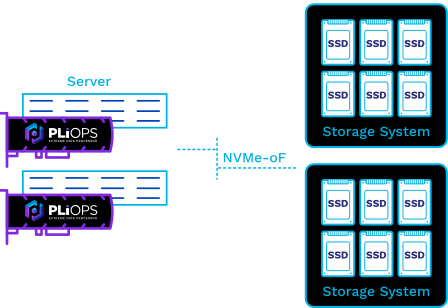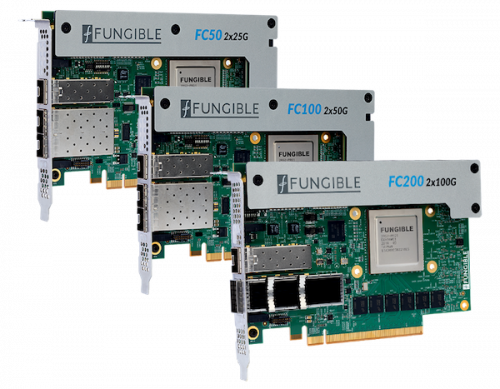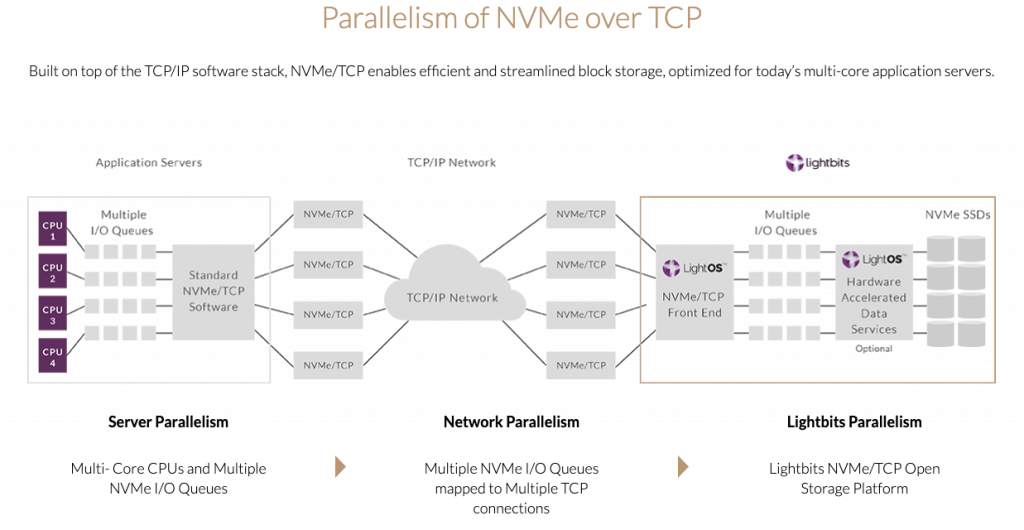Lightbits Labs Delivers Software-Defined NVMe/TCP Storage Solution for VMware
LightOS certified with VMware vSphere 7 update 3
This is a Press Release edited by StorageNewsletter.com on October 4, 2021 at 2:03 pmLightbits Labs, Inc. has completed a certification of LightOS with VMware vSphere 7 Update 3 and will be listed on the VMware Compatibility Guide.
The SDS, fueled by 3rd gen Intel Xeon Scalable processors with built in AI accelerators, Intel Optane Persistent memory (PMem) and 100Gb/s Intel Ethernet 800 Series Network Adapters, offersi performance, resilience, and scalability for VMware vSphere while lowering cost.
Lightbits pioneered NVMe/TCP, developing a disaggregated storage solution that is easy to deploy at scale, while delivering performance that is similar to local flash. As a VMware Technology Alliance Partner and design partner, Lightbits has been collaborating with VMware on development and testing of the new vSphere NVMe/TCP feature. Supporting native NVMe/TCP in VMware vSphere is a step toward delivering an end-to-end NVMe solutions ecosystem.
LightOS supercharges VMware environments with these benefits:
-
Simple: It’s easy to consume over TCP/IP networks using standard protocols and drivers. Seamlessly integrates into existing infrastructure and VMware environments.
-
Flexible: software only, disaggregated architecture allows for independent scaling of storage and compute. Runs on commodity hardware of customer’s choosing for a range of use cases.
-
Performance: Featuring Intel Xeon Scalable processors with Intel DL Boost, Intel Optane PMem, and Intel Ethernet 800 Series Network Adapters with ADQ technology, the vendor delivers high IO/s and low latency with performance that is equivalent to local flash without proprietary hardware and rigid capacity and performance constraints.
-
Lower TCO: Coupling Intel’s high-performance hardware platform with LightOS optimized for low-cost QLC SSDs, data reduction features improve efficiency, and disaggregated architecture maximizes resource utilization. Also, no hypervisor is required on storage nodes.
-
Highly Available: Rich data services such as SSD-level Elastic RAID, per-volume replication, multi-tenancy, snapshots, clones, remote monitoring, and more that result in highly resilient, high availability storage that extends across the entire virtualized platform.
“Digital leaders turn to Equinix for high performance, foundational infrastructure that can be deployed globally and on-demand,” said Zac Smith, Managing Director, Equinix Metal. “For years, NVMe/TCP has offered the promise of improved performance, increased deployment flexibility, and better cost efficiency through ‘hyperscale-style’ disaggregation of storage and compute, so we’re excited to see Lightbits, VMware, and Intel collaborating to bring this capability to our customers.”
LightOS is a scalable, efficient NVMe/TCP storage solution with intelligent flash management that improves flash endurance by up to 20x. It’s easy to deploy at scale and delivers performance that is equivalent to local flash. A single LightOS cluster can deliver over 40 million IO/s (random read) and 10PB user capacity, with less than 200μs latency.
Organizations previously utilizing iSCSI can instead use NVMe/TCP on the same network infrastructure and realize much higher performance. In addition to high performance, LightOS offers data services such as multi-tenancy, thin-provisioning, snapshots, clones, remote monitoring, dynamic rebalancing, and more that result in highly resilient storage that extends across the entire virtualized platform.
“With the explosion of data underway, companies are committing to digital transformation on a massive scale. To extract the value of this data, applications need to rapidly store, access, and analyze data. Over the past few years private clouds and cloud service providers have been running cloud native applications on Lightbits, benefiting from our Kubernetes integration. Now we are super-excited to have a high performance, highly available storage solution also for VMware users, with in-box support for NVMe/TCP,” said Kam Eshghi, chief strategy officer. “Organizations with private clouds and hybrid clouds, as well as cloud service providers and financial service providers can now realize the performance, scalability, and cost-efficiency benefits of a combined solution from VMware, Lightbits, and Intel.”
Lightbits, VMware, and Intel will jointly present a virtual breakout session, Cloud Everywhere Transformation: NVMe/TCP Operating Models on Data Center and Cloud, at VMworld 2021.
Paul Turner, VP product management vSphere, VMware, said: “Enterprise IT organizations supporting ESXi workloads, want access to the latest technologies to stay ahead in a highly competitive marketplace. Working with Lightbits and Intel, VMware is advancing its storage support with a strong roadmap for the NVMe-oF technology that gives data centers unprecedented remote access to NVMe storage. The addition of support for NVMe/TCP ensures that VMware hosts can better support modern applications that need high IOPS, low latency block storage solutions that offer large capacity and high density per storage server.”
Remi El-Ouazzane, chief strategy officer, datacenter and AI Group, Intel Corporation, said: “To overcome customer challenges requires addressing both hardware and software infrastructure in the data center, and partnerships with innovators like VMware and Lightbits strengthens our position to deliver complete solutions to solve those challenges. Intel’s platform breadth of high-performance technologies for the data center such as Intel Xeon Scalable processors, Intel Optane Persistent memory and Intel Ethernet 800 Series Network Adapters are essential to deliver on the promise of NVMe/TCP. The integration of LightOS with Intel technology, especially for VMware environments provides private-cloud infrastructure and cloud service providers customers with an optimized cost-efficient, lower TCO storage solution while maintaining high performance and very low latency.”
Christos Karamanolis, Lightbits Labs advisory board member, said: “This platform will provide core benefits to any organization that needs to increase the scale and utilization of their infrastructure, whether in financial services or other industries. LightOS enables data centers to take full advantage of NVMe/TCP. And when combined with the VMware ESXi and Intel hardware, organizations can rapidly and easily set up high-performance, scalable storage using the data center network they already have in place. For vSphere users who want flexibility, high availability, and high performance in a package that is easy to consume -this solution is compelling.”
Eric Burgener, VP eesearch, IDC: “Digital transformation and the move to more data-driven business models is well underway at most enterprises today. To enable agility and better meet the performance, scalability, availability and efficiency requirements, enterprises are modernizing their storage infrastructures and moving to more server-based, software-defined architectures that support NVMe and cloud technologies. We envision NVMe/TCP as being an enabler of cost-effective high-performance disaggregated storage architectures similar to what hyperscalers are using. This announcement makes available an off-the-shelf solution that delivers the same set of performance, availability, scalability, and efficiency benefits for enterprise IT organizations supporting virtualized environments that’s on par with the hyperscalers.”
Comments
Lightbits Labs, a pioneer in NVMe/TCP, once again announces a key strategic validation this time for VMware vSphere, following 2 majors steps with Intel and VMware vSAN, the latter announced 2 years ago at VMworld 2019.
This press release shows a very deep Intel relationship and just in the first paragraph, Intel is mentioned 4 times and globally 25 times in the PR while we see 23 times VMware.
To refresh our readers, the company played a key role in adding and developing the TCP transport service for NVMe to complement what was already available with FC, IB or RoCE.
The firm has been a bit confidential even with that key role in that TCP development and several competitors now popup on the market. The team has recognized that market adoption, and rapid one, is critical for its product line and more generally for the company. Having such validation with ESXi with Intel in the loop represents a must have milestone to satisfy users requests and address potential objections. We even anticipate some more deep partnerships and even closer ones in the following quarters.
This announcemznt confirms once again that NVMe and its companion NVMe-oF represents the fundamental layer for current and future storage challenges. It allows tons of servers connected to tons of SSDs via tons of volumes and maintain this "local SSD" view and behavior. In other words, the beauty of local storage and the sharing capability to reduce cost, offer potential availability and allow scalability.
TCP has the advantage to be adopted and deployed for decades and without the need of specific hardware. NVMe/TCP adoption is obviously easier that previous storage networks such FC that required specific switches and HBA, sometimes converged ones. And if we add IB and RoCE in the equation, these solutions are not for everyone, not everyone need them. This adoption potential barrier completely disappears with Ethernet and TCP networks making NVMe/TCP an easy and natural choice and a no brainer. But even if the ocean started blue it didn't stay like that a long time and we can say that today it is really red.
And the last NVMe 2.0 specs has added HDD confirming the universal role of NVMe. In addition to that, Zoned Namespaces provides better alignment between the SSD media and written data. It gives up to 20% more capacity, reduces write amplification and improves access latencies. Advantages that speak in favor of the "new" storage network again.

To put the market momentum in perspective, here is a list a few historical players who identified pretty early the need and market direction even if this trend was only confirmed a few years later.
Among these early vendors, there is mention Kaminario that morphed a few times and more recently changed radically its mission being a storage software infrastructure for database in the cloud under the name Silk.
Toshiba, now Kioxia, has also anticipated the wave and acquired OCZ several years ago to develop Kumoscale as a disaggregated storage engine for the date center based on NVMe-oF.
Add also Mangstor who became Exten Technologies with the asset acquired later by OVHcloud,
Apeiron Data became Paladian Data.
E8 Storage finally got acquired by AWS to feed the EBS product line and potentially be glued with Annapurna NICs. Annapurna Labs was acquired by AWS in 2016.
We must list also DSSD acquired by EMC in 2014 for $1 billion, the product was stopped in 2017.
Also worth to mention Excelero with a different approach with a required host driver. The firm continues to be pretty confidential.
On the network side, Kazan Networks, developer of NVMe-oF connectivity products, was acquired by Western Digital.
Following that wave big irons entered the segment and we find many of them, not to say all of them, promote NVMe-based solution with NVMe-oF capabilities. Delivering fast advanced high end storage system doesn't prevent failure and guarantee success, Vexata illustrates this, this interesting story ended and the product landed at StorCentric. Pavilion Data in the same area continues its independent journey.
In addition we saw for a few years the DPU coming fast with several players developing their own offering. Among them Fungible, Kalray, Pensando, Nebulon or Pliops. DPU can of course be added to target storage entities but also within acceleration card, the last example is what Fungible introduced recently. That approach brings new dimension to storage with the idea to offload expensing processing tasks like compression, encryption, erasure coding, mirroring or remote copy and of course augment security. In the case of Fungible, we even imagine some new specific capabilities with initiators cards linked to targets enabling TruFabric.

This NVMe-oF is definitely a hot storage industry segment to be monitor carefully with new players trying to go fast with innovators including Lightbits Labs, Fungible, Kalray, Nebulon, Excelero, Kioxia, Pavilion Data, Vexata by StorCentric or Pliops.















 Subscribe to our free daily newsletter
Subscribe to our free daily newsletter

